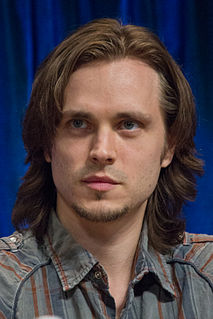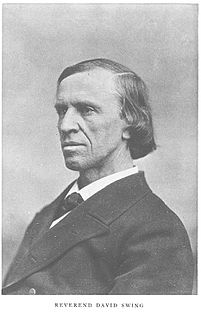A Quote by Ricky Gervais
I used to believe in God. The Christian one, that is (There are a few thousand to choose from. But I was born in a country where the dominant religion was Christianity so I believed in that one. Isn't it weird how that always happens?). Luckily I was also interested in science and nature. And reason and logic. And honesty and truth. And equality and fairness. By the age of eight I was an atheist.
Related Quotes
I have a sense of them being Easter religions, for some reason. Christianity, of course, is a mystery religion, too, and I believe that Arthur Machen was one of those especially interested in the link between the pagan mysteries and the Christian ones. So, my experience was also a Machenesque experience.
Christians have always tended to transform the Christian Revelation into a Christian religion. Christianity is said to be a religion like any other or, conversely, some Christians try to show that it is a better religion than the others. People attempt to take possession of God. Theology claims to explain everything, including the being of God. People tend to transform Christianity into a religion because the Christian faith obviously places people in an extremely uncomfortable position that of freedom guided only by love and all in the context of God's radical demand that we be holy.
If there were a reason for preferring the Christian religion to natural religion, it would be because the former offers us, on the nature of God and man, enlightenment that the latter lacks. Now, this is not at all the case; for Christianity, instead of clarifying, gives rise to an infinite multitude of obscurities and difficulties.
Since my logic aims to teach and instruct the understanding, not that it may with the slender tendrils of the mind snatch at and lay hold of abstract notions (as the common logic does), but that it may in very truth dissect nature, and discover the virtues and actions of bodies, with their laws as determined in matter; so that this science flows not merely from the nature of the mind, but also from the nature of things.
I've been an activist all my life. And always a liberal activist, for the simple reason that it is on the liberal left that you find the true recognition for the need for fairness in society. I'm not saying equality, because that you can never achieve, because equality is based on such complex criteria. But fairness is another issue.
It turned out I was pretty good in science. But again, because of the small budget, in science class we couldn't afford to do experiments in order to prove theories. We just believed everything. Actually, I think that class was called Religion. Religion class was always an easy class. All you had to do was suspend the logic and reasoning you were being taught in all the other classes.
The modern Gamaliel should teach ethics. Ethics is the science of human duty. Arithmetic tells man how to count his money; ethics how he should acquire it, whether by honesty or fraud. Geography is a map of the world; ethics is a beautiful map of duty. This ethics is not Christianity, it is not even religion; but it is the sister of religion, because the path of duty is in full harmony, as to quality and direction, with the path of God.
Kant's aim was to develop a religion within the boundaries of mere reason (that is, reason unaided by special empirical revelation) and then to ask about existing ecclesiastical faith (especially about Christianity, and the Lutheran Christianity of his time and place) how this revealed faith must be interpreted if it is to be reconciled with reason, and even seen as a wider (though morally optional) extension of a religion of reason.
But science can only be created by those who are thoroughly imbued with the aspiration toward truth and understanding. This source of feeling, however, springs from the sphere of religion. To this there also belongs the faith in the possibility that the regulations valid for the world of existence are rational, that is, comprehensible to reason. I cannot conceive of a genuine scientist without that profound faith. The situation may be expressed by an image: science without religion is lame, religion without science is blind.
I was always interested in science, truth, goodness and fairness. I have always been strongly individualistic and merit-oriented. This is probably because I was adopted and thus have always tended to cavalierly dismiss the importance of "blood ties" and any inherited or "unearned" group characteristics.




































